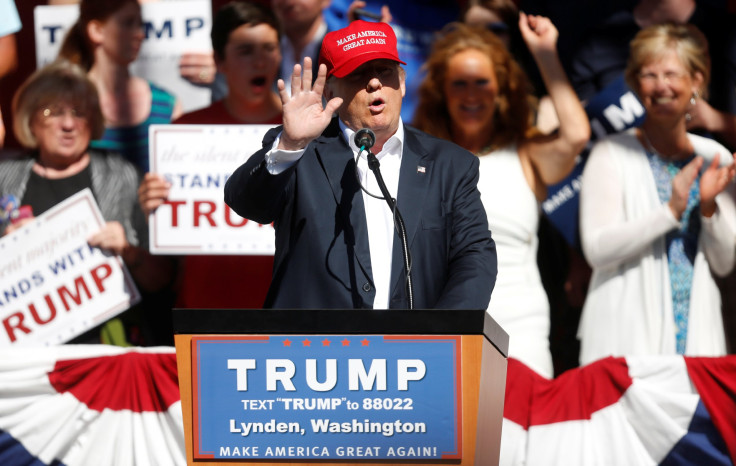How Rich Is Donald Trump? Republican’s Income Would Have Made It Tough To Self-Fund Whole Campaign

After months of proudly touting the fact that he was self-funding his presidential campaign, Donald Trump announced earlier this month he would accept donations in the general election to ensure he could compete against the Democratic candidate, but a Wall Street Journal analysis shows the Republican real estate magnate would have trouble if he tried to use only his own money between now and November.
This might seem surprising given that Trump has repeatedly said he is worth around $10 billion, but many have questioned how wealthy he really is. Trump has yet to release his tax returns, as most presidential candidates do, so it’s difficult to tell how much money he has.
But financial disclosures he released last summer showed Trump had somewhere between $78 million and $232 million in cash and other fairly liquid assets such as stocks and bonds. For 2016, his pretax income is likely to be around $160 million, the Wall Street Journal determined.
The paper’s analysis was based on “employment assets and income” such as real estate, golf courses, management companies and licensing deals listed in Trump’s financial disclosure, and it estimated his 2016 income by using documents and interviews. The disclosure, which Trump filed July 15, 2015, covers all of 2014 and the portion of 2015 until it was submitted.
While income in the hundreds of millions likely sounds like a lot of money to most Americans, those numbers fall far short of what is spent on modern presidential campaigns. Hillary Clinton, the Democratic front-runner, has already spent more than $157 million on her campaign this cycle, not including expenditures by super PACs and other groups. In 2012, President Barack Obama spent $721 million up to Election Day, and his Republican opponent, Mitt Romney, spent $449 million during that time.
If Trump plans to spend anywhere near those amounts, which he likely will have to do to be competitive in the general election, he will need more money than his disclosure seems to show he has. When the Wall Street Journal asked Trump’s campaign about its analysis, a spokeswoman said, “The income number is wrong by a lot, but Mr. Trump said, ‘Who cares — it doesn’t matter.’ ”
Trump told the WSJ earlier this year that he could raise additional “billions” by taking out loans against his assets, but said he has grown wary of taking on debt over the years, particularly after a brush with personal bankruptcy in the past.
It’s already clear that Trump could use some extra cash. His campaign’s spending increased by 50 percent in March over February, and as he pivots to take on Clinton he will need to spend more soon.
The candidate has been building out his fundraising operation in recent days. He recently hired a campaign finance chairman, and several experienced fundraisers told the Associated Press last week that Trump was open to a schedule of 50-100 fundraising events over the summer. Some Republican donors have said they will avoid helping Trump and instead focus on funding down-ballot races, but others such as megadonor Sheldon Adelson have committed to Trump.
To look through the Wall Street Journal’s estimates of Trump’s pretax income, click here.
© Copyright IBTimes 2025. All rights reserved.






















